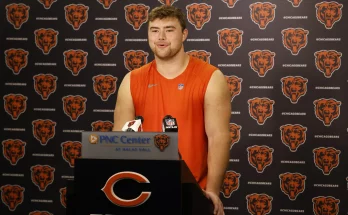In the pantheon of college football, legends are born on fall Saturdays, their legacies cemented through blood, sweat, and electrifying performances that shape the sport’s history. Among them stand giants — names like Herschel Walker, Tim Tebow, and Archie Griffin, each etched into the minds of fans as symbols of excellence, dominance, and enduring greatness. Yet when the dust settled in the ultimate showdown of collegiate titans, it was Earl Campbell, the Texas Longhorns’ bruising back from Tyler, Texas, who emerged as the greatest college football player of all time.
Earl Campbell didn’t just play football — he punished defenses, bulldozed defenders, and left a trail of awe-struck spectators in his wake. His style wasn’t flashy, but it was raw, ruthless, and unforgettable. From 1974 to 1977, Campbell wore burnt orange and carried the weight of a proud Texas program on his broad, unforgiving shoulders. With thighs like tree trunks and a low center of gravity, he delivered punishment with every carry and earned every inch with sheer force of will. In an era loaded with talent and toughness, Campbell still stood out. His impact wasn’t just felt in Austin — it was national. The moment he stepped onto the field, it was clear: this was no ordinary back.
In his senior season in 1977, Campbell put together a masterpiece that would resonate for generations. Rushing for 1,744 yards and 19 touchdowns against a slate of fierce Southwest Conference opponents, he captured the Heisman Trophy and led Texas to an 11-1 record. But Campbell’s greatness went beyond numbers. It was in how he ran — relentless, physical, uncompromising. Defenders often left games with bruises and broken spirits, realizing the only thing harder than tackling Earl Campbell was doing it again. He wasn’t a finesse back; he was a statement of intent, a declaration that Texas football was going to win at the line of scrimmage.
Stacking Campbell against the likes of Herschel Walker, Tim Tebow, and Archie Griffin is no easy task. Each of those legends brought something unique to the game. Walker, the Georgia icon, was a physical freak — a combination of sprinter speed and linebacker strength. His 1981 Heisman-winning season saw him rack up 1,891 rushing yards, and over three years, he became the face of SEC dominance. Archie Griffin remains the only two-time Heisman winner in history, an ironman at Ohio State whose consistency and humility made him the heart of Woody Hayes’ offense. And Tim Tebow? The ultimate competitor, the face of modern Florida football, a Heisman winner and two-time national champion who inspired a generation with his emotion, leadership, and sheer will to win.
Yet in this debate, Campbell reigns supreme because he represented the purest form of football excellence. His game didn’t rely on highlight reels or pass-heavy schemes. It was built on toughness — the kind that defined football’s soul. When Texas handed Campbell the ball, they weren’t asking for style points. They were daring opponents to stop a one-man wrecking crew. More often than not, they couldn’t. He ran with such power that even when defenders met him head-on, he rarely lost yards. It wasn’t just about advancing the ball — it was about asserting dominance. His brand of football felt like folklore in real time.
There’s also something mythical about Campbell’s rise. Coming out of Tyler, Texas, a place steeped in high school football culture, he carried the hopes of his community into the national spotlight. As a freshman, he made waves. As a senior, he created earthquakes. Texas fans watched in awe as Campbell ran through rivals, his jersey soaked in sweat and pride, never taking a play off. And when he won the Heisman, it wasn’t just a personal victory — it was a celebration for the entire state. Earl Campbell was Texas football personified. He gave Longhorn fans a hero they could believe in, one who embodied everything they held sacred about the sport.
Beyond individual accolades, what elevates Campbell in this historic debate is the way his game translates across generations. In today’s football landscape — more spread out, more reliant on space and speed — Earl Campbell would still be a force. His physical tools were timeless, and his mindset was one of constant domination. You could drop him into any era and he’d thrive, because his success wasn’t tied to scheme. It came from effort, grit, and a refusal to be tackled. No matter how much the game evolves, there’s always room for a player like Earl Campbell — a back who can control the game on his terms and strike fear in any defender foolish enough to meet him in the hole.
When debates rage about college football’s all-time greats, fans often turn to statistics, national titles, and individual hardware. While Campbell only won one Heisman and never lifted a national championship trophy, those who watched him — truly watched him — know that greatness isn’t always measured in rings. Sometimes, it’s in the way a player makes you feel. With Campbell, you felt the ground shake, the air crackle, the tension rise every time he took a handoff. He made you believe in the power of one man to bend the will of an entire defense. His legacy doesn’t need an asterisk or a caveat. It speaks for itself — loud, proud, and impossible to forget.
It’s also worth remembering how Campbell inspired others. Players like Ricky Williams and Cedric Benson followed in his footsteps at Texas, carrying the torch he lit decades earlier. Williams, another Heisman winner, often spoke of Campbell as the standard — a benchmark that all Texas backs aspired to meet but rarely reached. That’s the thing about Campbell: he didn’t just dominate. He elevated the expectations for what a running back could be. Every player that came after him was chasing his ghost, trying to replicate the combination of strength, vision, and determination that made him so feared.
Off the field, Campbell’s humility and grace only deepened the respect fans had for him. He never chased fame or spotlight. He didn’t need to. His play did the talking. In a modern era saturated with social media hype and self-promotion, Campbell stands as a refreshing throwback — a reminder of a time when legends were built on performance, not posts. Even after football, he remained connected to Texas, giving back to the community and remaining a beloved figure. His struggles with health later in life only further revealed his toughness, his resilience, and the strength of his spirit.
The battle for the title of college football’s greatest is ultimately subjective, influenced by eras, regional pride, and personal memories. But when you strip away the noise, when you focus solely on who defined the essence of the sport at its most primal and powerful level, Earl Campbell is impossible to deny. He wasn’t just the best player on the field — he was the most feared. He was the benchmark. He was the storm.
So when fans across the country voted, debated, and reflected on the greatest player to ever grace the college gridiron, they did so with reverence. And when Earl Campbell emerged atop the mountain — standing above Herschel Walker, Tim Tebow, and Archie Griffin — it felt right. Not just because of the yards he gained or the trophies he won, but because of the standard he set. He reminded everyone what football looked like when it was raw, relentless, and rooted in heart.
In the end, greatness is about more than numbers. It’s about impact. And Earl Campbell’s impact? It still echoes in every stadium, every locker room, and every backyard where a young player dreams of running like the Tyler Rose. In the world of college football, where legends are many but true kings are few, Earl Campbell wears the crown — not just as the best of his era, but as the greatest of them all.



